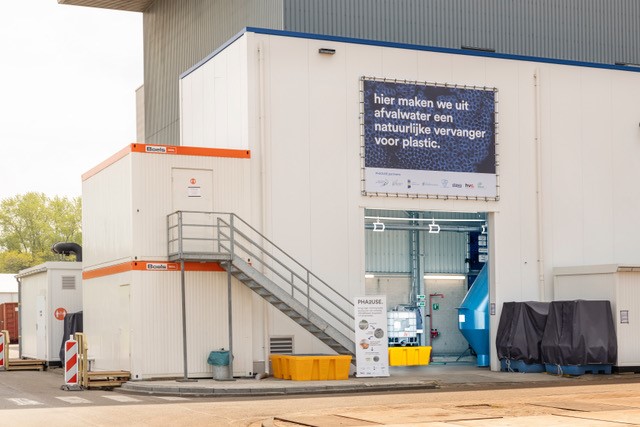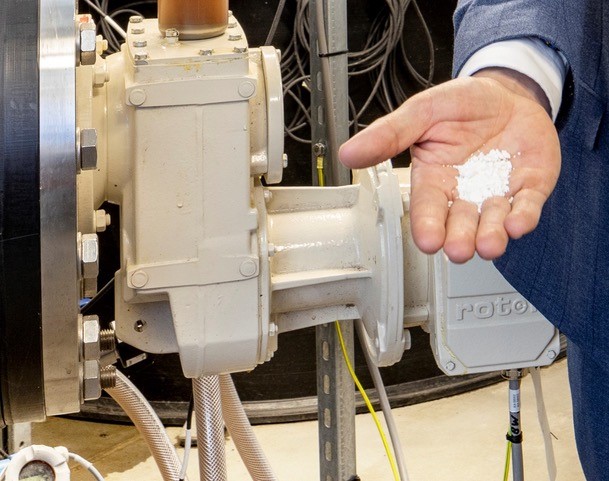An upscaled demonstration plant for production of a natural plastic substitute commenced operations this week in Dordrecht. The installation produces a bacterial grown natural substitute for plastic, scientifically known as polyhydroxyalkanoate or PHA in short. With this installation, cooperating partners intend to bridge the gap to commercial production of this natural plastic substitute by producing larger quantities for application development. The Wetsus’ Bioplastics from Water theme has been involved in scaling up its production by developing critical scientific knowledge. And it hopes to do so in the future, continuing its research through EU-projects SCALIBUR, Agro2Circular, and PhD-projects.
For further information, see the Dutch press release below the pictures.


Persbericht
Dordrecht, 10 mei 2022
Natuurlijke plastic-vervanger een stap dichterbij
Demonstratiefabriek in Dordrecht in bedrijf genomen
Vandaag zetten we een belangrijke stap om een nieuwe natuurlijke plastic-vervanger te maken.
We openen een demonstratiefabriek op het terrein van HVC in Dordrecht, waarin we de grondstof
voor deze plastic-vervanger gaan maken uit natuurlijke reststoffen. Het materiaal heeft de
voordelen van plastic maar niet de nadelen: het is licht en vormbaar, is verwerkbaar als plastic én
volledig biologisch afbreekbaar, waardoor er geen microplastics in de natuur worden
achtergelaten. Drie producenten gaan de nieuwe natuurlijke plastic-vervanger uitproberen en
toepassen. De samenwerkingspartners zien legio mogelijkheden: van afbreekbare kweeknetjes en
landbouwplastic tot zelfhelend beton. In de toekomst zien we potentie voor
consumententoepassingen met een groot risico dat microplastics in het milieu komen, zoals bij
schoenzolen en textiel.
Publiek private samenwerking
De installatie is mogelijk door een bijzondere samenwerking tussen private en publieke partijen die
elkaar vinden in het zetten van stappen naar een duurzame economie. Met de demonstratiefabriek
willen de samenwerkingspartners een brug slaan naar een commerciële productie van de natuurlijke
plastic-vervanger. De demonstratie-installatie maakt het voor een groot aantal geïnteresseerde
bedrijven mogelijk om het nieuwe materiaal te testen en toe te passen in hun producten als
alternatief voor plastic. Het doel is na de demonstratiefase op te schalen en grotere installaties neer
te zetten die het mogelijk zullen maken om de natuurlijke plastic-vervanger op de markt te brengen.
De samenwerkingspartners zijn blij met de start van de fabriek. Otto van der Galiën, Wetterskip
Fryslân: “We hebben een natuurlijke, hoogwaardige én daarmee ook een zeer waardevolle
toepassing gevonden die plastic uit aardolie kan vervangen en daarmee microplastic in het milieu
fors kan terugdringen. We gaan het product nu produceren en laten uittesten door marktpartijen en
zetten daarmee een belangrijke stap voorwaarts in de circulaire economie.”
Bacteriën doen het werk
Het nieuwe materiaal wordt gemaakt uit natuurlijke reststoffen. De werking is als volgt. In afvalwater
zitten veel vetzuren. De bacteriën in onze demonstratie-installatie ‘vreten zich vol’ met deze
vetzuren en zetten het om naar een nieuw materiaal dat plastic kan vervangen. Zoals mensen vet in
het lichaam opslaan, slaan deze bacteriën dit materiaal vervolgens als een energiereserve in hun cel
op. Deze stof wordt eruit gehaald (‘gepurificeerd’), waarna er een poeder overblijft. Dat poeder kan
gebruikt worden als natuurlijke plastic-vervanger in verschillende toepassingen.
Samenwerkingspartners
De demonstratiefabriek wordt ontwikkeld en gerealiseerd door een samenwerkingsverband
bestaande uit de waterschappen Brabantse Delta, De Dommel, Hollandse Delta, Scheldestromen en
Wetterskip Fryslân, kenniscentrum STOWA, technologiebedrijf Paques Biomaterials en duurzaam
energie- en afvalbedrijf HVC. Slibverwerking Noord-Brabant (SNB), AquaMinerals, TU Delft en Wetsus
(kenniscentrum voor duurzame watertechnologie) steunen het initiatief met verdere
kennisontwikkeling.